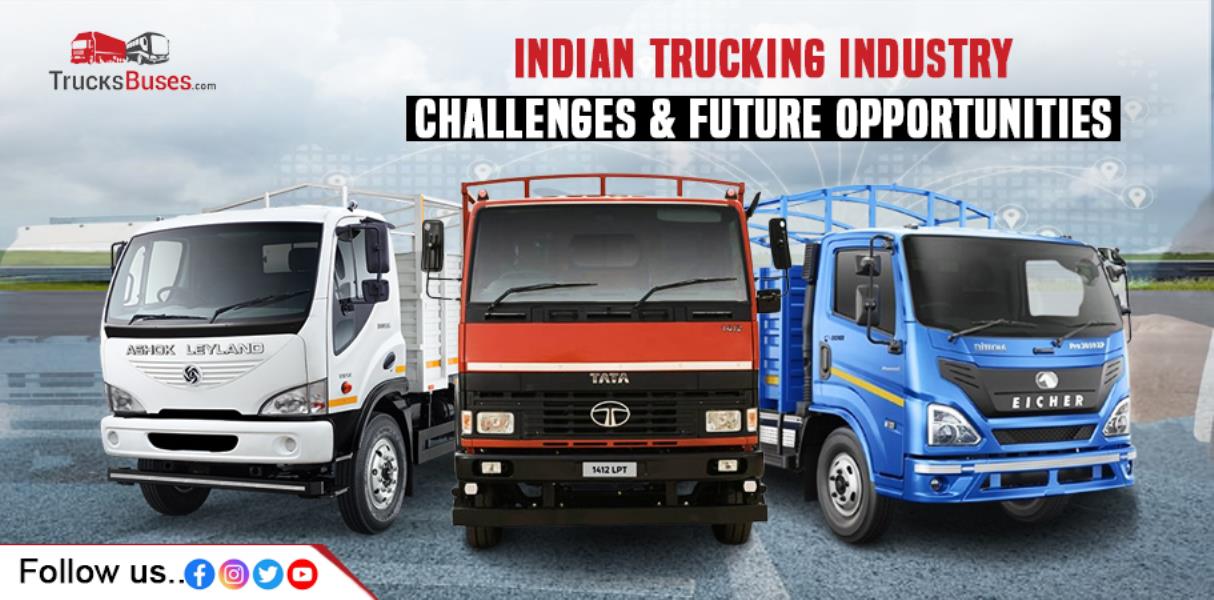Indian Trucking Industry: Challenges and Future Opportunities
By | Published Date : September 28, 2024
As India rides the wave of a strong post-pandemic recovery, the nation has now surpassed the UK to become one of the top five economies globally. This achievement sets the stage for India to reach its ambitious goal of a 5 trillion GDP within the next few years. To achieve this milestone, it is crucial to boost the domestic logistics industry. Logistics is vital not only for transporting goods but also for creating jobs. In today’s world of just-in-time inventory and rapid deliveries, the role of logistics has become even more critical. India's unique logistics landscape presents both challenges and opportunities for the trucking community.

India's Standing in the Global Logistics Arena
Globally, logistics powerhouses benefit from highly organized, technology-driven, and cost-effective operations. However, these markets face their challenges, such as rising fuel costs due to the Russia-Ukraine war and frequent supply chain disruptions in the post-pandemic era. Conversely, India’s logistics sector has often been criticized for its fragmented and unorganized nature. Operational costs in India are significantly higher between 50 to 100 percent more compared to leading global markets. Technology adoption is relatively low, leading to inefficiencies. Nonetheless, recent years have seen rapid changes, with significant improvements on the horizon.
Tech-Driven Transformation
India's logistics sector, currently valued at 250 billion, is poised for significant growth, projected to reach $380 billion by FY25. The rise of India as a global IT hub has positively impacted the trucking industry. Advanced technologies such as AI, machine learning, data analytics, GPS, and IoT are transforming the sector. Online trucking marketplaces have revolutionized operations by connecting transporters, shippers, and truckers via 24/7 smartphone apps. This digital shift allows truckers to find loads more efficiently and reduces waiting times significantly.
Streamlining and Speeding Up Operations
Traditionally, truckers faced long waiting periods between loads, often relying on personal networks to find new business. Modern trucking platforms address this issue by enabling real-time connections between truckers and shippers. With these platforms, truckers can pre-book loads and maximize their operational days, often working 25-26 days a month. This improvement not only enhances efficiency but also increases profitability for truckers.
Vehicle-Load Matching
Another challenge in the Indian trucking industry is inefficient vehicle-load matching. Trucks often carry less than their capacity, leading to wasted space and reduced earnings. Conversely, shippers may struggle to find appropriately sized trucks, resulting in higher costs. Advanced AI technology in trucking platforms offers precise vehicle-load matching, automating the process and eliminating wastage. This efficiency reduces time spent on logistics and improves overall cost-effectiveness.
Route Optimization
GPS-based navigation tools have revolutionized route planning for truckers. These tools help identify the most efficient routes, avoiding traffic and roadblocks. This not only saves time but also reduces fuel consumption and emissions, leading to significant cost and environmental benefits. Route optimization is a key factor in improving the efficiency of the trucking industry.
Benefits for Truckers
Technology-driven logistics platforms offer numerous benefits beyond operational efficiency. Truckers now have access to online medical consultations, GPS services, spare parts purchases, and insurance options through these platforms. These additional services improve the overall quality of life for truckers and support their well-being.
The Road Ahead
The future of trucking in India is promising, with the introduction of the National Logistics Policy by the Prime Minister. This policy aims to revolutionize the logistics sector by reducing costs, streamlining processes, and enhancing coordination among various ministries. Key initiatives include the Unified Logistics Interface Platform (ULIP), which will integrate all stakeholders into a single platform, and the Logistics Ease Across Different States (LEADS) program, which will facilitate smoother cargo movement. These developments signal a new era of efficiency and growth for the Indian trucking industry.
Key Players in the Indian Trucking Industry
Tata Motors
Tata Motors is a major player in the Indian trucking sector, offering a diverse range of Tata trucks tailored to various needs. Their models are known for their durability and performance. Tata’s innovative solutions and strong service network contribute significantly to the industry’s growth.
Ashok Leyland
Ashok Leyland is another leading brand in the Indian trucking market. Known for its extensive range of Ashok Leyland trucks, from light to heavy-duty, Ashok Leyland focuses on robustness and efficiency. Their commitment to innovation and technology helps address many of the challenges faced by truckers.
Eicher Trucks
Eicher, part of the Volvo Group, is renowned for its fuel-efficient and eco-friendly trucks. Eicher trucks are designed to offer high performance while minimizing environmental impact. Their focus on technology and sustainability makes them a significant player in the Indian market.
BharatBenz
BharatBenz, a Daimler brand, provides a comprehensive range of medium and heavy-duty trucks. Known for their advanced technology and robust design, BharatBenz trucks are well-suited to Indian conditions. The brand’s focus on local needs and innovations helps it stand out in the competitive market.
Will Government Policies Alone Be Enough to Revamp the Logistics Sector?
Government policies are crucial for improving the logistics sector, but they may not be enough on their own. While initiatives like the National Logistics Policy aim to streamline processes and reduce costs, successful reform also depends on industry collaboration and private investment. Companies must adopt new technologies and improve infrastructure to complement these policies. Effective implementation and continuous adaptation to market needs are key. So, while policies provide a foundation, the combined efforts of the government, businesses, and technology are necessary to fully revamp the logistics sector.
Conclusion
While the Indian trucking community faces several challenges, the advancements in technology and supportive government policies offer exciting opportunities for growth and improvement. As the industry evolves, it holds the potential to significantly contribute to India's economic progress and enhance the lives of those involved in logistics.
Read Also:
Mahindra Announces 1,000 New Scholarships for Daughters of Truck Drivers: Key Details Revealed
Selecting the Right Driver and Truck for Profitable Business